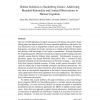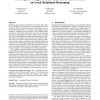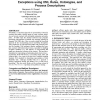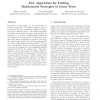130 search results - page 22 / 26 » Logic Programming Agents and Game Theory |
AI
2010
Springer
13 years 4 months ago
2010
Springer
How do we build algorithms for agent interactions with human adversaries? Stackelberg games are natural models for many important applications that involve human interaction, such...
ICFP
2010
ACM
13 years 8 months ago
2010
ACM
Reasoning about program equivalence is one of the oldest problems in semantics. In recent years, useful techniques have been developed, based on bisimulations and logical relation...
WWW
2003
ACM
14 years 8 months ago
2003
ACM
SweetDeal is a rule-based approach to representation of business contracts that enables software agents to create, evaluate, negotiate, and execute contracts with substantial auto...
CORR
2008
Springer
13 years 7 months ago
2008
Springer
Recent work has shown how information theory extends conventional full-rationality game theory to allow bounded rational agents. The associated mathematical framework can be used ...
STOC
1994
ACM
13 years 11 months ago
1994
ACM
Interactions among agents can be conveniently described by game trees. In order to analyze a game, it is important to derive optimal (or equilibrium) strategies for the di erent p...




